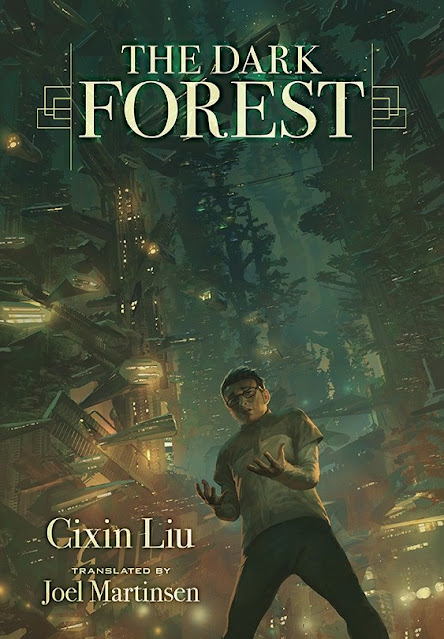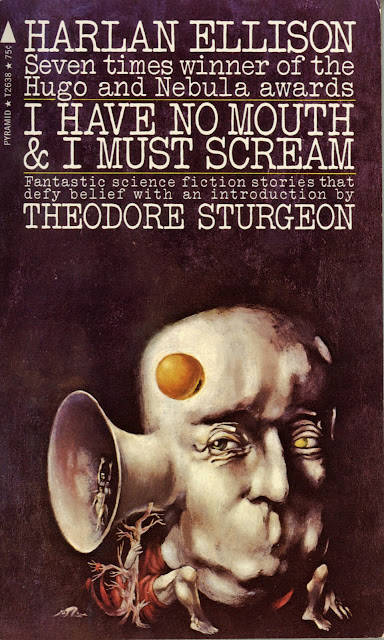1Q84 - Haruki Murakami: My opinion with spoilers
1. Introduction
► Publication year: 2011
► Genre: Fiction, fantasy. Readers, beware! This is not SCIENCE FICTION to any degree.
► Themes: Japanese culture, women abuse, crime, religion and cults, writing, sex, people's ears, people's fingers against their temples, women's breasts, preparing food, classical music.
► Páginas: 812
This is my first book by Haruki Murakami. I read it in English and I liked it. I think it is well-written. This is the longest book I've read in English (English is my second language). Read my short, spoiler-free review on Goodreads.
 |
| Artwork by Nacho Yagüe |
2. Title
★★✩✩✩
You cannot help but think almost immediately about 1984 by George Orwell but there isn't a strong nor meaningful connection with Orwell's work. More than an easy literary reference, the title conveys little meaning, hence I don't like the title.
3. Structure
★★★✩✩
The structure of the book is simple but it helps the reader to make well-paced stops. Since this is a book so long, its structure was pretty useful.
But, the parallel stories between the two protagonists went on for far too long. Even in one of the last chapters when the characters are reunited, the chapter is titled after one of them, not both. Just a cheap trick to entitle the last chapter with both protagonist names.
4. Themes
★★★★★
The themes in the book are interesting, absorbing. You get hooked quickly.
4.1. World-building
★★✩✩✩
World-building was weak. You cannot get immersed in the universe of the book because the author doesn't build it deep enough. You can even say he uses cheap tricks to keep you engaged, but he doesn't deliver on certain things in the book: Why the two moons? What did the Little People want?
5. Style
★★★★✩
Style is consistent. The paragraphs and the chapters are long enough and with the right amount of description and detail.
5.1. Dialogues
★★★✩✩
Although Haruki has good characters, the dialogues are scarce (taking into account the length of the novel). Nonetheless, the dialogues are good but not memorable.
Probably I'm biased by not being close to Japan or Asian culture. But the conversations are one-sided. Different characters reach the same conclusion without effort and they agree with each other rather quickly. It was weird for me as well that the characters were certain about things I wouldn't be certain about and they were hesitant about things that I would consider more clear. I couldn't connect there.
5.2. Technique
★★★★★
The technique is impressive. The book is well-edited and it has a consistent, strong technique. 1Q84 is well-written and you can go through the massive amount of pages somewhat easily because of this. I enjoyed the reading.
5.3. Pace
★★★✩✩
The pace is remarkable. Not too slow, not too fast. But, the book is too long and it becomes repetitive. The book would have had an excellent pace with half the pages it had. I was frustrated here and there screaming silently: OK! I get it! You have said that 10 times already!. While in other pages I was screaming: Please explain this! This is the thing that should be described in detail!
1Q84 starts well, with the first book being amazing. The second book is decent but the third one was slow-paced on purpose. In terms of pace, the 3 books are not well-balanced.
6. Relevance
★★★✩✩
I don't know Japanese culture so I wouldn't know how relevant this book is in cultural terms. For me, it doesn't give me much food for thought after I read the last page.
7. Characters
★★★✩✩
Characters are good, distinct, and consistent. Tamaru was quite interesting to me. As well as Ponytail. What's with Ponytail? Why does he never talk?
On the other hand, I think Haruki ruined Ushikawa by being excessively descriptive about his physical features. He overdid it and in the process, messed up a really intriguing character.
Highlights
Some of the characters feel human, with regrets, mistakes, vices, and flaws, specially Ushikawa.
The bad and the ugly
All characters have strange reactions I couldn't really understand. Like Aomame's being transported to an alternate world without much surprise, Tengo's reactions to almost everything it happens to him, Aomame's reaction to handling a gun (having murdered two men already).
Characters don't grow, change or have any arc during the story.
Tengo is a bad character overall. Math prodigy, a talented -or, at least promising- author, a skilled and beloved teacher, a martial arts champion, a big guy who is also a magnet for certain women; yet he's boring, uninspiring, dull, simple, and unidimensional.
 |
| Town of cats |
8. Depthness
★★★✩✩
Despite the book being long, it's not that deep because its flaws in the world-building aspect.
9. Plot
★★★★★
The plot is thrilling. It has the right elements and a good proportion of twists, but the book needs a lot of editing, fewer pages, and a better pace.
The best of the plot
Ushikawa's death. This scene was very well-done. One of the highlights of the book for me.
The town of cats. This doesn't advance the plot nor is central to it, but it was a fabulous story.
--
The worst of the plot
The two moons: Shallow symbolism, unnecessary. Plot-convenient but nothing more.
The Little People: After more than 800 pages, you end up confused and ignorant about the Little People. There was huge underdevelopment of the Little People.
The 3rd book: The third book was mediocre, going downhill and going in circles to fill pages of uninteresting things. Nothing really good happens in this book with the exception of Ushikawa's death. I was bored to death with the surveillance, with the confinement of Aomame, with Tengo's last moments with his father, with the Air Chrysalis from Ushikawa's mouth.
10. Ending
★★★✩✩
The book has a decent ending. It's far from a good one, but it's not a bad one either. Nonetheless, and I bet this is the author's choice, there are many mysteries left unresolved. Some of them are acceptable for me and I can live with that, some others aren't:
Acceptable plot holes and unresolved things:
* What happens to the baby?
* Aomame didn't die, although it was pointed out that she would in order to save Tengo. Is she going to die in the new reality?
Unacceptable plot holes and unresolved things:
* The Little People start creating an Air Chrysalis with Ushikawa's hair. Why? What for? Why did they have to finish it in two days?
* What happened to Tengo's lover, other than being "irretrievable lost"?
* What really happened to Tengo's mother? Why did she die in a similar way to Aomame's friend?
* What was the significance of the NHK fee collector who bothered Fuka-Eri, Aomame and Ushikawa? If this is a reference to Tengo's father? Why? What for?
* What was the significance of the NHK fee collector who bothered Fuka-Eri, Aomame and Ushikawa? If this is a reference to Tengo's father? Why? What for?
Definitely a work to discuss at length. I liked some of the questions for discussions on the internet, like the following:
- Why does Murakami end the book with the image of Tengo and Aomame gazing at the moon until it becomes “nothing more than a gray paper moon, hanging in the sky?"
- In what ways does 1Q84 question and complicate conventional ideas of authorship? How does it blur the line between fictional reality and ordinary reality?
- Does Leader appear to be a true spiritual master?
- At first, Ushikawa is a creepy, totally unlikable character. How does Murakami make him more sympathetic as the novel progresses? How did you respond to his death?
- Tengo realizes that rewriting Air Chrysalis is highly unethical and that Komatsu is asking him to participate in a scam that will very likely cause them both a great deal of trouble. Why does he agree to do it? What do you think about his decision? If you were in Tengo's place, would you do it?
- Why would Murakami choose to set his story in 1984, the year that would serve as the title for George Orwell’s famous novel about the dangers of Big Brother?
- The dowager insists, and Aomame agrees, that the killing they do is justified and that more women will be victims if they aren’t stopped. Have the two done nothing wrong? Are they rationalizing their desire for vengeance from their histories?
- The taxi driver in Chapter 1 tells Aomame: “There’s always only one reality.” Does this statement hold true throughout the novel? Is there only one reality, despite what appears to be a second reality that Aomame and Tengo enter?
- 1Q84 is a vast and intricate novel. What are the pleasures of reading such a long work, of staying with the same characters over such a long period of time?
- What elements of the mystery genre does 1Q84 employ? How does Murakami keep readers guessing about what will happen next? What are some of the book’s most surprising moments?
- Aomame tells Ayumi: “We think we’re choosing things for ourselves, but in fact, we may not be choosing anything. It could be that everything’s decided in advance and we pretend we’re making choices. Free will may be an illusion”. Do the events in the novel seem fated or do the characters have free will?
- What is the appeal of the fantastic elements in the novel—the little people, maza and dohta, the air chrysalis, two moons in the sky, alternate worlds, etc.? What do they add to the story? In what ways does the novel question the nature of reality and the boundaries between what is possible and not possible?
Conclusion
This could have been a masterpiece if it weren't that long. Repetitive but well-written. I could read Murakami again but a way shorter book. Murakami is a capable writer and I'm certain this is not his best work. Reading this was a challenge and an exploration for me, but I won't be reading another Murakami's book in at least a year.
Recommended to:
Readers who like to invest a lot of time in the universe of one book.
Readers who are not anxious because they want all the answers.
Murakami's die-hard fans.


















Comments
Post a Comment